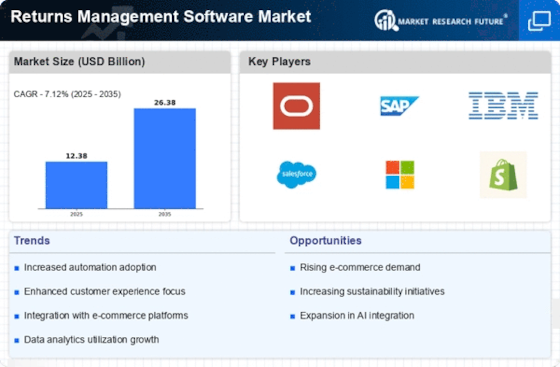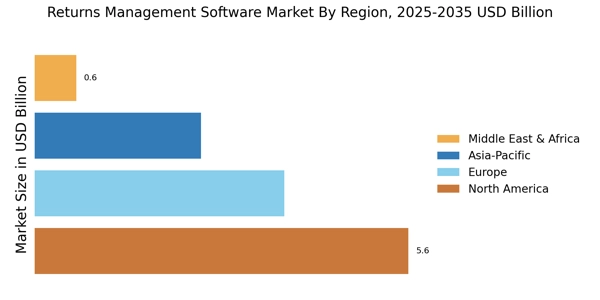Regulatory Compliance
The Returns Management Software Market is also influenced by the need for regulatory compliance. As governments implement stricter regulations regarding consumer rights and product returns, businesses must adapt their returns processes accordingly. Compliance with these regulations often requires sophisticated software solutions that can track and manage returns efficiently. In 2025, it is anticipated that compliance-related investments in returns management software will increase, as companies aim to avoid penalties and enhance their operational integrity. This regulatory landscape creates a significant opportunity for software providers to develop solutions that not only meet compliance standards but also improve overall returns management efficiency.
Focus on Sustainability
The Returns Management Software Market is witnessing a growing emphasis on sustainability. As consumers become more environmentally conscious, businesses are compelled to adopt sustainable practices, including efficient returns management. Returns management software can facilitate the tracking of returned products and their subsequent disposition, allowing companies to minimize waste and optimize resource use. In 2025, it is projected that companies prioritizing sustainability in their returns processes will gain a competitive edge. This focus on sustainability not only aligns with consumer expectations but also enhances brand reputation, further driving the demand for returns management software.
Rising E-commerce Adoption
The Returns Management Software Market is experiencing a notable surge due to the increasing adoption of e-commerce platforms. As more consumers turn to online shopping, the volume of returns has escalated, necessitating efficient returns management solutions. In 2025, e-commerce sales are projected to reach approximately 6 trillion USD, highlighting the growing need for robust returns management systems. This trend compels retailers to invest in software that can streamline the returns process, enhance customer satisfaction, and reduce operational costs. Consequently, the demand for returns management software is likely to grow, as businesses seek to optimize their return policies and improve overall efficiency.
Technological Advancements
Technological advancements play a crucial role in shaping the Returns Management Software Market. Innovations such as artificial intelligence, machine learning, and automation are transforming how returns are processed and managed. These technologies enable businesses to analyze return patterns, predict future returns, and automate various aspects of the returns process. As companies increasingly adopt these technologies, the demand for advanced returns management software is expected to rise. In 2025, the integration of AI-driven analytics into returns management solutions could enhance decision-making and operational efficiency, thereby driving market growth.
Enhanced Customer Experience
In the Returns Management Software Market, enhancing customer experience is a pivotal driver. Companies are increasingly recognizing that a seamless returns process can significantly influence customer loyalty and retention. Research indicates that 67% of consumers consider a hassle-free return policy as a key factor in their purchasing decisions. As businesses strive to differentiate themselves in a competitive landscape, investing in returns management software becomes essential. This software not only simplifies the returns process but also provides valuable insights into customer behavior, enabling companies to tailor their offerings. Thus, the focus on customer experience is likely to propel the growth of the returns management software market.

















